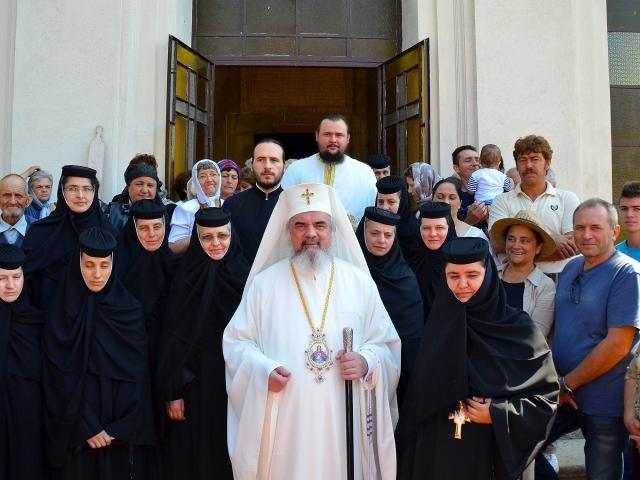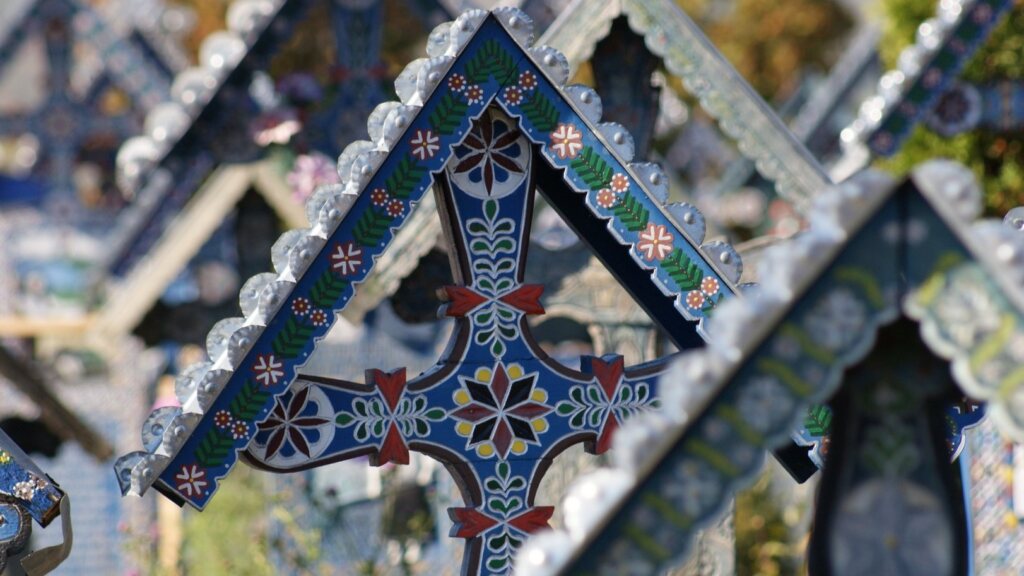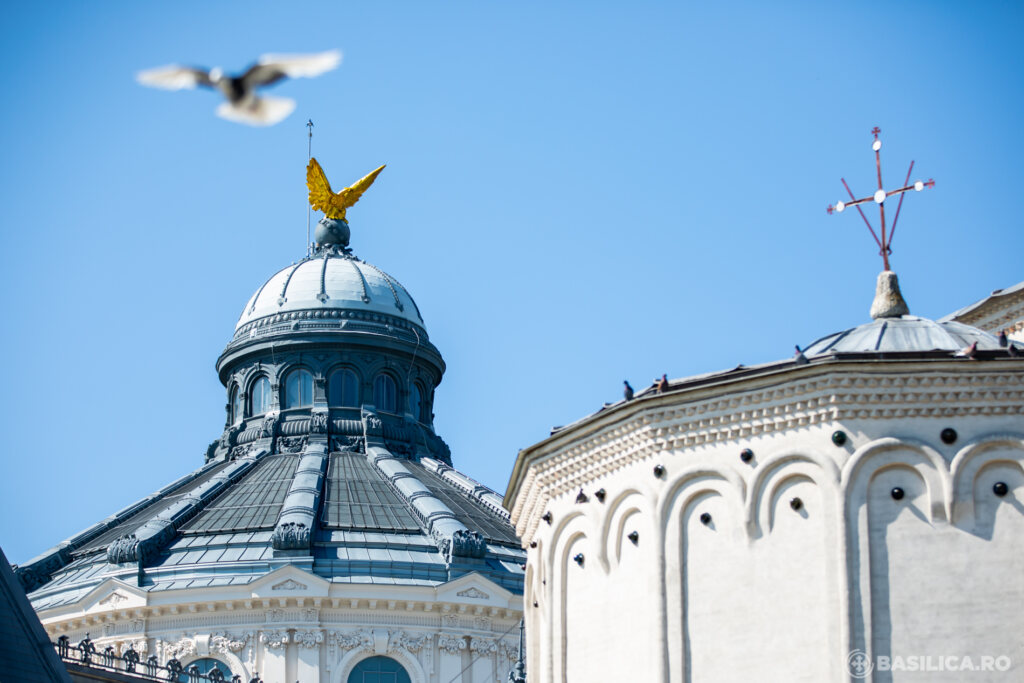On the 10th Sunday after the Pentecost the Patriarch of Romania was in the middle of the community of Ghighiu Monastery, county of Prahova. On this day, 1 September 2013, a new church year began in the Orthodox Church. On this occasion, His Beatitude Patriarch Daniel delivered a thanksgiving sermon in the presence of the faithful present at Ghighiu Monastery, county of Prahova, for all the boons received during the last church year – we learn from Trinitas Radio station. His Beatitude has also prayed God for the year the Church has just begun.
In the sermon delivered during the Divine Liturgy, His Beatitude explained the Evangelical pericope that the Church scheduled to be read on this day, concerning the healing of the demonised boy.
“The Gospel shows us three great truths, namely, first of all that Jesus notices that it is much suffering and little faith in the world. Secondly, that although they have little faith, Christ, our Lord, is full of merciful love and heals the demonised child dominated by a bad spirit who was brought to Him by the child’s father. We also see that Jesus Christ, our Saviour, shows the truth that the bad spirits do not get easily out of the man demonised, and this is why he says that this kind of demons leaves only with prayer and fasting, showing in this way the importance of prayer and fasting for healing the sick people, especially those dominated by bad spirits”, Hid Beatitude said.
Then, His Beatitude showed the importance of fasting united with prayer in our lives: “Christ, our Lord, shows us that strong faith means strong presence of the grace of God in the man and only having this presence of the grace of God in the man, as a result of the faith, the bad spirits are afraid to remain in the humans and then they leave. As soon as he reproves His disciples for their little faith, Christ, the Lord adds: this kind of demons leave only with prayer and fasting. This means that prayer united with fasting becomes stronger.”
His Beatitude has also shown that prayer with no fasting is weaker: “That is because fasting is a state of offering, a free offering brought to God as a sort of confirmation of our dependence on the help of God before any hope in the material things. The temporary food that we consume for feeding the body gives a certain physical force, but not a spiritual force, because only prayer gives us spiritual force. When man is fasting he is focused on prayer. While fasting, hunger and thirst of material food changes into hunger and thirst of spiritual food, according to the merciful permanent never setting love of God. Therefore, when man is fasting he is fed differently, rather on the words of the Holy Scripture, on the prayer as a living direct relationship of man with God”.
The Patriarch has also spoken about sufferance and on its pedagogical role.
“Christ, the Lord, wants the people who suffer to have strong faith to be healed, just like those around them, because very often the children suffer because of their parents’ lack of faith or sins. The Gospel does not tell us why this child has become demonised, but one can understand that in fact the parents’ lack of faith, or some of their sins made the bad spirit take courage to torment this child. Sometimes the children suffer not because of their parents’ sins, but their sufferance is a call for their parents to hope more in the help of God than of the humans, than in the material things, in the social position, fortune, or influential relations. Therefore the child in distress is a warning of the parents and of all those around because only when we are faced with disease we realize how big the good health is as a gift of God. (…) Christ, the Lord, does not want anybody to suffer, but sometimes sufferance is allowed so that man should strengthen his faith and wish eternal life more than the temporary happiness on the earth”, the Patriarch said. His Beatitude has also spoken about the beginning of the church year: “Today, 1 September, the Orthodox Church celebrates the beginning of the new church year, the beginning of the indiction. The church year begins on 1 September, and the civil year on 1 January. The Bible tradition kept till today at the Jews says that the history of humankind began in the autumn, in paradise, when the trees were bearing fruit. This tradition of the beginning of the church year in the autumn is taken over from the Old Testament where the New Year is called the Head or Beginning of the Year, also because Christ, the Lord, announced in an autumn, on a Saturday, in the synagogue, that Isiah prophecy: The Sovereign Lord has filled me with his spirit and He has sent me to bring good news to the poor, and freedom to those in prison, related the new church year to the beginning of the fulfilment of Isaiah’s prophecy in the saving work of Jesus Christ in the world”, His Beatitude said.
The Primate of the Romanian Orthodox Church showed that the church year is a new year of the salvation by which the mystery of the Church is revealed: “The first feast of the church year is the Birth of the Mother of God because the Mother of God is the living icon of the Church, while the last month of the church year has three great feasts referring to the ultimate realities, to the end of the world, namely: the Transfiguration of the Lord shows the glory of Christ who will come to judge the living and the dead, the Falling Asleep of the Mother of God shows the mystery of the Church which passes, which moves us from this temporary world, from the temporary life to the eternal permanent life. The third feast is the Beheading of Saint John the Baptist who is the teacher of repentance. Saint John the Baptist and the Mother of God will intercede for the salvation of the sinners who repented their souls, but did not live long enough in the world to show their repentance in deeds, while Christ, the Lord, transfigurated in full glory, is the Right Judge who will show Himself at the end of the world. Therefore, the church year is the year of salvation, and every year is a new year of salvation by which the mystery of the Church is shown to us in which Christ is present who calls the world to salvation through the Gospel, through the Saints Apostles, and through the servants of the holy altars”.
“We thank God now, at the beginning of the church year for all the boons received in the last church year and we also pray for the help of God in the new church year we have just begun. This church year means that now, at the beginning of the year, we are going to come to Church more often, to confess more often, to have the Eucharist more often, to do more good deeds than the last year and to think that every moment, every hour, day, week and month represents a time of salvation, of our union with God, because we shall be judged in the mood that death will find us. If death finds us reconciled with God, and our fellow being, we reach heaven, but is the time of death finds us separated from God we do not get eternal happiness, but the unhappiness not to have requited the love of God with our love”, His Beatitude said.
The beginning of the New Church Year was instituted by the Holy Fathers at the Ecumenical Synod I of Nicene, when the date of 1 September was established as the beginning of the Christians’ salvation, in the memory of Christ’s entrance at the Jews’ assembly to announce the “year well pleased to God”. The Holy Fathers (318) participating in the Nicene Ecumenical Synod I of 325 decided that the beginning of the preaching of the Gospel by Jesus Christ, our Saviour, took place at the beginning of September, because the Saviour entered into the synagogue of Nazareth (Luke 4:14-19), after he returned from the desert of Carantania, in the seventh month, also called Tishri (corresponding to September in our calendar).






